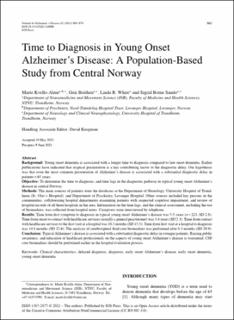Time to diagnosis in young onset alzheimer's disease: A population-based study from central Norway
Peer reviewed, Journal article
Published version
Permanent lenke
https://hdl.handle.net/11250/2826288Utgivelsesdato
2021Metadata
Vis full innførselSamlinger
Sammendrag
Background: Young onset dementia is associated with a longer time to diagnosis compared to late onset dementia. Earlier publications have indicated that atypical presentation is a key contributing factor to the diagnostic delay. Our hypothesis was that even the most common presentation of Alzheimer’s disease is associated with a substantial diagnostic delay in patients < 65 years. Objective: To determine the time to diagnosis, and time lags in the diagnostic pathway in typical young onset Alzheimer’s disease in central Norway. Methods: The main sources of patients were the databases at the Department of Neurology, University Hospital of Trondheim (St. Olav’s Hospital), and Department of Psychiatry, Levanger Hospital. Other sources included key persons in the communities, collaborating hospital departments examining patients with suspected cognitive impairment, and review of hospital records of all three hospitals in the area. Information on the time lags, and the clinical assessment, including the use of biomarkers, was collected from hospital notes. Caregivers were interviewed by telephone. Results: Time from first symptom to diagnosis in typical young onset Alzheimer’s disease was 5.5 years (n = 223, SD 2.8). Time from onset to contact with healthcare services (usually a general practitioner) was 3.4 years (SD 2.3). Time from contact with healthcare services to the first visit at a hospital was 10.3 months (SD 15.5). Time from first visit at a hospital to diagnosis was 14.8 months (SD 22.6). The analysis of cerebrospinal fluid core biomarkers was performed after 8.3 months (SD 20.9). Conclusion: Typical Alzheimer’s disease is associated with a substantial diagnostic delay in younger patients. Raising public awareness, and education of healthcare professionals on the aspects of young onset Alzheimer’s disease is warranted. CSF core biomarkers should be performed earlier in the hospital evaluation process.

